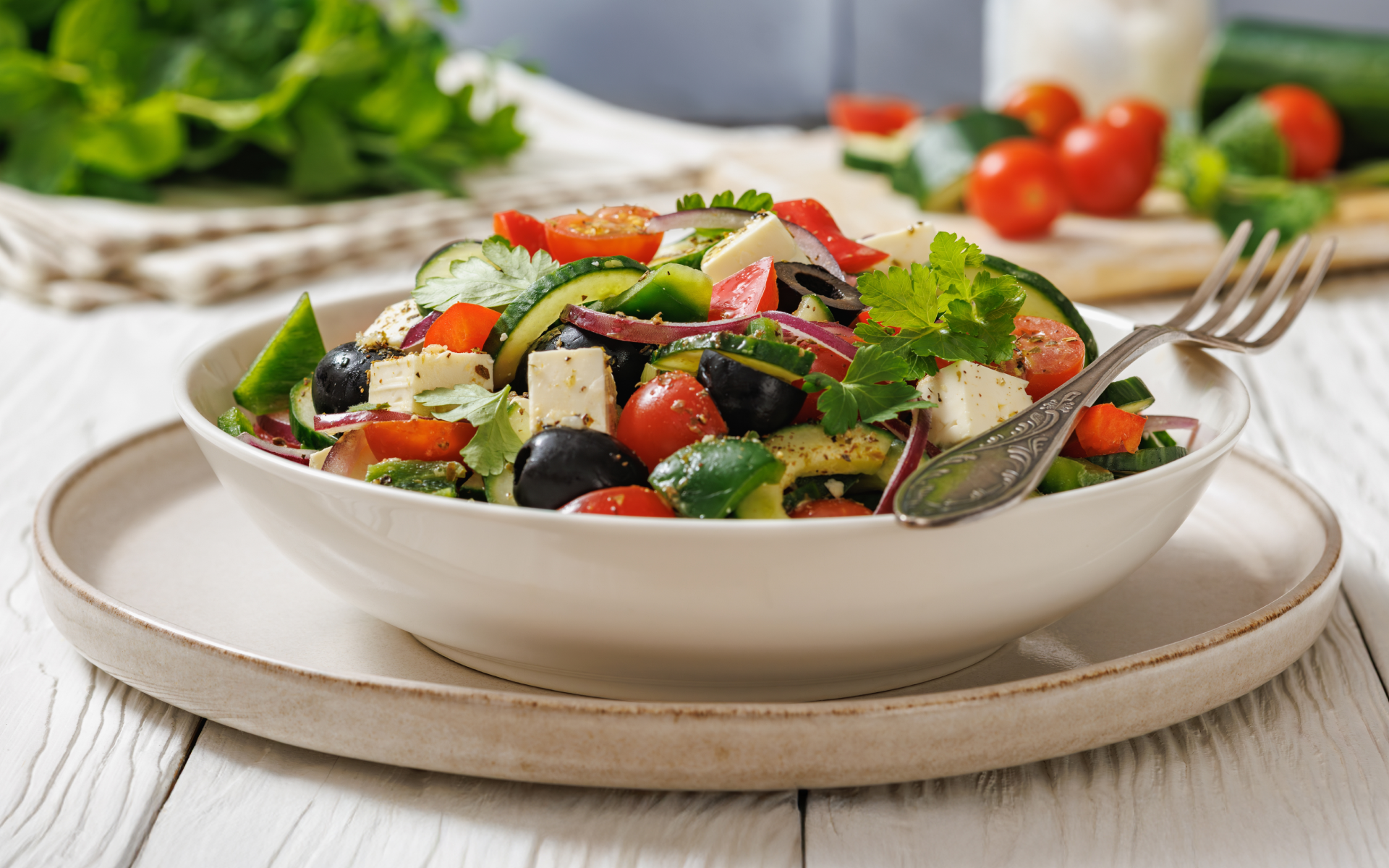The Mediterranean diet isn’t just a diet, it’s a lifestyle. It focuses on the traditional eating habits of countries in the Mediterranean region, such as Greece, Italy, and Spain.
Research places it as one of the healthiest diets for weight loss, as well as for overall health (1). A study published in the New England Journal of Medicine found that people on the Mediterranean diet supplemented with extra virgin olive oil or nuts had a lower incidence of major cardiovascular events compared to those who followed a standard low-fat diet (2).
The Mediterranean diet emphasizes whole, plant-based foods such as fruits, vegetables, whole grains, legumes, and nuts. It also includes moderate amounts of dairy products, fish, and poultry. Red meat and sweets are limited, but not completely eliminated (1).
In addition, it emphasizes using healthy fats such as olive oil instead of saturated fats such as butter.
Here’s how to follow the 7-day Mediterranean diet plan for weight loss.
What Is a 7-Day Mediterranean Diet for Weight Loss?
A 7-day Mediterranean diet for weight loss is a meal plan that is based on the traditional eating habits of people in the Mediterranean region. It focuses on whole, minimally processed, largely plant-based foods and encourages moderation rather than restriction.
It’s a calorie- and portion-controlled diet that can lead to sustainable weight loss when it’s followed consistently.
To determine your calorie needs on this diet, you can use a calorie calculator or consult a registered dietitian.
Experts suggest a 500-calorie deficit per day for healthy and sustainable weight loss (3). This means aiming to eat approximately 500 fewer calories than you expend. However, it’s important to remember that individual calorie needs vary based on factors such as age, sex, activity level, and current weight.
Portion sizes are also important to consider on the Mediterranean diet. According to the American Heart Association (4):
- A serving of baked potato should be approximately the size of an average-sized fist (or a baseball).
- A serving of meat or poultry should be no larger than a deck of cards
- A serving of cheese should be approximately the size of four dice
- A serving of vegetables should be about the size of a baseball
However, these are general guidelines and portion sizes may differ based on your individual calorie needs and goals.
Some portion control tips to keep in mind when following the Mediterranean diet for weight loss include:
- Measuring out portions using measuring cups and spoons
- Using a food scale to accurately measure serving sizes
- Eating slowly and mindfully to feel satisfied with smaller portions
- Stopping when you feel comfortably full rather than overeating
- Drinking plenty of water throughout the day to help with feelings of hunger and fullness
Now that you have an understanding of the basics of the Mediterranean diet, let’s take a look at the foods that are encouraged when following this meal plan.
Reasons why BetterMe is a safe bet: a wide range of calorie-blasting workouts, finger-licking recipes, 24/7 support, challenges that’ll keep you on your best game, and that just scratches the surface! Start using our app and watch the magic happen.
What Are the Top 10 Foods in a Mediterranean Diet?
The Mediterranean diet emphasizes whole, minimally processed foods that are nutrient-dense and provide a wide range of health benefits. It also prioritizes plant-based foods, while not completely eliminating animal products. Here are 10 of the top foods to include in your 7-day Mediterranean diet plan for weight loss:
1. Fruits and Vegetables
Fruits and vegetables are staples of the Mediterranean diet, providing a wide range of vitamins, minerals, and antioxidants (5). They are also low in calories and high in fiber, which makes them great options for weight loss.
Some popular fruits and vegetables to include in your meals and snacks include:
- Berries (blueberries, strawberries, raspberries)
- Tomatoes
- Leafy greens (spinach, kale, arugula)
- Bell peppers
- Eggplant
- Citrus fruits (oranges, lemons)
2. Whole Grains
Whole grains have been linked to improved heart health and can help with weight loss when they replace refined grain products in the diet (6). The Mediterranean diet encourages whole grains such as:
- Whole-wheat bread and pasta
- Brown rice
- Quinoa
- Farro
3. Legumes
Legumes, also known as pulses, are an excellent source of plant-based protein and fiber. They can help keep you feeling full and satisfied, which makes them a valuable addition to the Mediterranean diet for weight loss (7).
Some examples of legumes include:
- Chickpeas
- Lentils
- All varieties of beans
- Soybeans and soy products such as tofu
4. Olive Oil
Olive oil is a staple of the Mediterranean diet and is used in place of other oils or butter for cooking and dressings. It’s high in heart-healthy monounsaturated fats and has anti-inflammatory properties (8).
5. Nuts and Seeds
Nuts and seeds are also an important part of the Mediterranean diet, providing healthy fats, protein, and fiber (9). They can be enjoyed as a snack or added to meals for extra crunch and flavor.
Some options include:
- Almonds
- Walnuts
- Pumpkin seeds
- Chia seeds
6. Fish
Fish is a major source of protein in the Mediterranean region and is recommended for its heart-healthy omega-3 fatty acids (10). The Mediterranean diet encourages eating fish at least twice a week, with options such as:
- Salmon
- Tuna
- Sardines
7. Yogurt and Cheese
While dairy is limited on the Mediterranean diet, yogurt and cheese can still be included in moderation. They provide calcium and protein (11), but low-fat or nonfat forms should be chosen.
8. Herbs and Spices
Herbs and spices are used generously in Mediterranean cooking, adding flavor without needing to use excess salt or unhealthy seasonings. Some common herbs and spices that are used include:
- Basil
- Oregano
- Rosemary
- Cumin
9. Red Wine (in moderation)
Moderate consumption of red wine is allowed on the Mediterranean diet, but there’s no need to start drinking wine if you don’t already – it’s optional. In the past, red wine has been linked to heart health benefits due to its antioxidant content, but more recent research suggests that any alcohol consumption increases health risks, which likely outweighs any benefits of the antioxidants (12). If you do choose to drink, it’s important to limit alcohol consumption and always drink in moderation.
10. Dark Chocolate
Dark chocolate is a popular treat on the Mediterranean diet, providing antioxidants and possible other health benefits when it’s enjoyed in moderation (13). Look for dark chocolate with a high percentage of cacao for the most nutritional value.
What Is Not Allowed on a Mediterranean Diet?
While the Mediterranean diet encourages a wide variety of nutrient-dense foods, there are some items that should be limited or avoided altogether. These include:
- Processed meats (bacon, deli meats)
- Fried and processed foods
- Added sugars (sodas, candy)
- Saturated fats (butter, fatty cuts of meat)
- Refined grains (white bread, white rice)
By limiting these items and focusing on whole, minimally processed foods, you can reap the health benefits of the Mediterranean diet and support your weight loss goals. For more details about the Mediterranean diet food list, take a look at our prior publication.
Sample 7-Day Mediterranean Diet Meal Plan for Weight Loss
Here’s an example of a 7-day meal plan for weight loss on the Mediterranean diet:
Day 1
- Breakfast: Greek yogurt with honey, topped with mixed berries and a sprinkle of chia seeds.
- Snack: A handful of almonds.
- Lunch: Quinoa salad with cucumber, tomatoes, olives, feta cheese, and a drizzle of olive oil and lemon juice.
- Snack: Sliced apple with a tablespoon of almond butter.
- Dinner: Grilled salmon with a side of steamed broccoli and roasted sweet potatoes, drizzled with olive oil and sprinkled with herbs.
Day 2
- Breakfast: Whole-grain toast topped with mashed avocado, cherry tomatoes, and a poached egg.
- Snack: Carrot sticks with hummus.
- Lunch: Mixed greens salad with grilled chicken, cherry tomatoes, cucumbers, olives, and a vinaigrette made from olive oil and balsamic vinegar.
- Snack: A small bowl of mixed berries.
- Dinner: Baked cod with a quinoa and vegetable medley (bell peppers, zucchini, and onions), seasoned with herbs and olive oil.
Day 3
- Breakfast: Oatmeal made with almond milk, topped with sliced banana, walnuts, and a dash of cinnamon.
- Snack: Greek yogurt with a drizzle of honey.
- Lunch: Lentil soup with a side of whole-grain bread.
- Snack: A handful of mixed nuts.
- Dinner: Grilled chicken souvlaki with a side of tabbouleh and a small Greek salad.
Day 4
- Breakfast: Smoothie with spinach, banana, Greek yogurt, and a splash of almond milk.
- Snack: Celery sticks with a tablespoon of peanut butter.
- Lunch: Whole grain wrap with hummus, mixed greens, shredded carrots, and grilled chicken.
- Snack: A small pear.
- Dinner: Shrimp stir-fry with mixed vegetables (bell peppers, snap peas, broccoli) and brown rice.
Day 5
- Breakfast: Whole-grain cereal with almond milk, topped with sliced strawberries and chia seeds.
- Snack: A small handful of walnuts.
- Lunch: Chickpea and vegetable stew with a side of whole-grain bread.
- Snack: A small orange.
- Dinner: Baked chicken breast with a side of roasted Brussels sprouts and mashed cauliflower.
Day 6
- Breakfast: Greek yogurt parfait with granola, mixed berries, and a drizzle of honey.
- Snack: Sliced cucumbers with tzatziki sauce.
- Lunch: Mediterranean quinoa bowl with chickpeas, cherry tomatoes, cucumbers, olives, and a lemon-tahini dressing.
- Snack: A small handful of pistachios.
- Dinner: Grilled swordfish with a side of Mediterranean couscous salad and steamed asparagus.
Day 7
- Breakfast: Whole-grain toast topped with ricotta cheese, sliced figs, and a drizzle of honey.
- Snack: A small bowl of mixed berries.
- Lunch: Spinach and feta stuffed bell peppers with a side of mixed greens.
- Snack: Sliced apple with a tablespoon of almond butter.
- Dinner: Grilled lamb chops (small portion) with a side of ratatouille and whole-grain pasta.
This Mediterranean 7-day meal plan incorporates a variety of whole, minimally processed foods, which ensures balanced nutrition and sustainable weight loss.
The Mediterranean diet doesn’t require strict portion control and is focused on balance and moderation.
To lose weight on this diet, it’s important to find a balance between calorie intake and physical activity. In addition to following the principles of the Mediterranean diet, regular exercise can lead to long-term weight loss and improved overall health (14).
Your dietary needs and preferences may vary, so feel free to adjust this meal plan to suit your individual needs.
For example, if you prefer vegetarian options, you can swap the chicken and fish for plant-based protein sources such as tofu or tempeh. If you have any food allergies or intolerances, you must make substitutions accordingly.
Here’s a sample vegetarian 7-day Mediterranean diet for weight loss:
Day 1
- Breakfast: Greek yogurt with honey, topped with mixed berries and a sprinkle of chia seeds.
- Snack: A handful of almonds.
- Lunch: Quinoa salad with cucumber, tomatoes, olives, feta cheese, and a drizzle of olive oil and lemon juice.
- Snack: Sliced apple with a tablespoon of almond butter.
- Dinner: Stuffed bell peppers with quinoa, black beans, corn, and spices, topped with a sprinkle of cheese.
Day 2
- Breakfast: Whole-grain toast topped with mashed avocado, cherry tomatoes, and a poached egg.
- Snack: Carrot sticks with hummus.
- Lunch: Mixed greens salad with chickpeas, cherry tomatoes, cucumbers, olives, and a vinaigrette made from olive oil and balsamic vinegar.
- Snack: A small bowl of mixed berries.
- Dinner: Baked falafel with a side of tabbouleh and a small Greek salad.
Day 3
- Breakfast: Oatmeal made with almond milk, topped with sliced banana, walnuts, and a dash of cinnamon.
- Snack: Greek yogurt with a drizzle of honey.
- Lunch: Lentil soup with a side of whole-grain bread.
- Snack: A handful of mixed nuts.
- Dinner: Grilled vegetable skewers with a side of couscous and a yogurt-tahini sauce.
Day 4
- Breakfast: Smoothie with spinach, banana, Greek yogurt, and a splash of almond milk.
- Snack: Celery sticks with a tablespoon of peanut butter.
- Lunch: Whole-grain wrap with hummus, mixed greens, shredded carrots, and roasted vegetables.
- Snack: A small pear.
- Dinner: Eggplant parmesan with a side of steamed broccoli.
Day 5
- Breakfast: Whole-grain cereal with almond milk, topped with sliced strawberries and chia seeds.
- Snack: A small handful of walnuts.
- Lunch: Chickpea and vegetable stew with a side of whole-grain bread.
- Snack: A small orange.
- Dinner: Baked tofu with a side of roasted Brussels sprouts and mashed cauliflower.
Day 6
- Breakfast: Greek yogurt parfait with granola, mixed berries, and a drizzle of honey.
- Snack: Sliced cucumbers with tzatziki sauce.
- Lunch: Mediterranean quinoa bowl with chickpeas, cherry tomatoes, cucumbers, olives, and a lemon-tahini dressing.
- Snack: A small handful of pistachios.
- Dinner: Grilled halloumi with a side of Mediterranean couscous salad and steamed asparagus.
Day 7
- Breakfast: Whole-grain toast topped with ricotta cheese, sliced figs, and a drizzle of honey.
- Snack: A small bowl of mixed berries.
- Lunch: Spinach and feta stuffed bell peppers with a side of mixed greens.
- Snack: Sliced apple with a tablespoon of almond butter.
- Dinner: Ratatouille with whole-grain pasta and butter beans.
In a previous blog post titled Vegetarian Mediterranean Diet, we discussed the benefits of following a Mediterranean-style diet. This 7-day meal plan is just one example of how you can incorporate the principles of this diet into your daily meals, while also catering to a vegetarian lifestyle.
Read more: Mediterranean Diet Meal Plan For A Smooth-Flowing Weight Loss Journey
How to Lose Belly Fat on a Mediterranean Diet
Losing belly fat on the Mediterranean diet follows the same principle of creating a calorie deficit through a healthy and balanced diet (15). By incorporating whole, minimally processed foods that are rich in nutrients and low in calories, you can achieve sustainable weight loss and reduce belly fat through the Mediterranean diet (16).
As this diet naturally encourages a fiber-rich and plant-based approach, it can also help improve digestive health and satiety, which further promotes weight loss (17). In addition, you should opt for lean protein sources such as fish, poultry, and plant-based proteins, which can help build muscle mass and boost metabolism (18).
To target belly fat specifically, incorporating physical activity into your daily routine is essential. This could include activities such as brisk walking, jogging, or strength training exercises (19).
Consistency is important when it comes to losing belly fat – you should aim for at least 30 minutes of moderate exercise every day.
Finally, keep an eye on portion sizes and avoid overeating – even if the food is considered healthy. The Mediterranean diet encourages mindful eating and listening to your body’s hunger and fullness cues.
The BetterMe: Health Coaching app will provide you with a host of fat-frying fitness routines that’ll scare the extra pounds away and turn your body into a masterpiece! Get your life moving in the right direction with BetterMe!
What Is the Fastest Way to Lose Weight on the Mediterranean Diet?
The fastest way to lose weight on the Mediterranean diet is by creating a calorie deficit through a combination of healthy eating and regular physical activity. This includes incorporating plenty of fruits, vegetables, whole grains, lean protein sources, and healthy fats into your meals while also staying within your recommended calorie intake. Dive deeper into the Mediterranean diet macros with our dedicated article.
You should also aim for at least 30 minutes of moderate exercise every day and avoid overeating by practicing mindful eating habits. It’s important to note that losing weight quickly may not necessarily mean it will be sustainable in the long term. Slow and steady progress is the key to seeing lasting results on any diet plan.
What Is the Average Weight Loss per Week on the Mediterranean Diet?
Average weight loss per week on the Mediterranean diet varies for each individual, as it depends on factors such as current weight, age, genetics, and level of physical activity. However, a safe and sustainable amount to aim for is 1-2 pounds per week (20). This can be achieved by following a balanced and nutritious diet while also staying physically active.
How Long Does it Take to See Results on a Mediterranean Diet?
It may take anywhere from 2-4 weeks to start seeing results on the Mediterranean diet. However, this can vary for each individual depending on their starting weight and level of physical activity. It’s important to remember that consistency is the key when it comes to any diet or lifestyle change and results may come at a different pace for each person.
If you focus on making long-term healthy choices rather than quick fixes, you can expect to see sustainable results over time.
Why Am I Not Losing Weight on a Mediterranean Diet?
The main reason you may not be losing weight on a Mediterranean diet is because you’ve not created a calorie deficit. Despite following a healthy and balanced diet, if you consume more calories than you burn through daily metabolic processes and physical activity, weight loss won’t occur.
Another reason could be that you’re not properly tracking your food intake and may be eating more than you realize. It’s important to practice mindful eating and pay attention to portion sizes to ensure you stay within your recommended calorie intake to achieve weight loss (21) (22).
Make sure to incorporate regular physical activity into your routine to boost metabolism and promote weight loss (23).
Finally, remember that weight loss takes time and consistency. Don’t be discouraged if you don’t see immediate results – simply stay consistent with healthy choices and the results will come in due time.
Frequently Asked Questions
How many eggs a day can I eat on the Mediterranean diet?
The Mediterranean diet doesn’t restrict the number of eggs you can consume in a day. However, it’s important to incorporate other sources of protein such as fish, beans, legumes, and nuts into your daily meals. This promotes a variety of nutrient-dense foods and reduces the intake of unhealthy fats.
Are potatoes OK on a Mediterranean diet?
While potatoes aren’t a staple of the traditional Mediterranean diet, they can be consumed in moderation as part of a balanced diet (1). The Mediterranean diet focuses on whole, minimally processed foods and encourages variety and balance. Potatoes, sweet potatoes, and other root vegetables certainly fit the bill. You can incorporate them into dishes such as roasted vegetable medleys or homemade soups.
Is pasta OK on a Mediterranean Diet?
Pasta is allowed on the Mediterranean diet, but it should be consumed in moderation and as part of a balanced meal (1). Opt for whole-grain or legume-based pasta options, which are higher in fiber and nutrients compared to traditional white pasta. Incorporate plenty of vegetables, lean protein sources, and healthy fats into your pasta dishes to ensure well-rounded meals.
Is Greek food Mediterranean food?
Yes, Greece is a Mediterranean country and its traditional cuisine heavily reflects the principles of the Mediterranean diet (24). This includes an emphasis on fresh fruits and vegetables, whole grains, lean proteins, and healthy fats such as olive oil.
However, not all Greek cuisine is in alignment with the Mediterranean diet due to modern influences and variations in dishes. So, when choosing Greek food while following this diet plan, it’s best to stick to traditional dishes and opt for homemade options whenever possible.
Conclusion
The Mediterranean diet isn’t just a quick fix for weight loss, it’s a lifestyle that promotes overall health and well-being. By including plenty of fresh fruits, vegetables, whole grains, legumes, nuts, and lean proteins in your meals, you can support weight loss while also providing your body with essential nutrients.
The key is moderation in all things, including physical activity and portion sizes. Follow this 7-day meal plan and stay consistent with healthy habits, and you’ll see sustainable results in the long term.
DISCLAIMER:
This article is intended for general informational purposes only and does not serve to address individual circumstances. It is not a substitute for professional advice or help and should not be relied on for making any kind of decision-making. Any action taken as a direct or indirect result of the information in this article is entirely at your own risk and is your sole responsibility.
BetterMe, its content staff, and its medical advisors accept no responsibility for inaccuracies, errors, misstatements, inconsistencies, or omissions and specifically disclaim any liability, loss or risk, personal, professional or otherwise, which may be incurred as a consequence, directly or indirectly, of the use and/or application of any content.
You should always seek the advice of your physician or other qualified health provider with any questions you may have regarding a medical condition or your specific situation. Never disregard professional medical advice or delay seeking it because of BetterMe content. If you suspect or think you may have a medical emergency, call your doctor.
SOURCES:
- The Mediterranean diet and health: a comprehensive overview (2021, onlinelibrary.wiley.com)
- Primary Prevention of Cardiovascular Disease with a Mediterranean Diet Supplemented with Extra-Virgin Olive Oil or Nuts (2018, nejm.org)
- 2018 Korean Society for the Study of Obesity Guideline for the Management of Obesity in Korea (2019, ncbi.nlm.nih.gov)
- What Is a Serving? (2024, heart.org)
- Fruits, vegetables, and health: A comprehensive narrative, umbrella review of the science and recommendations for enhanced public policy to improve intake (2019, tandfonline.com)
- A Whole-Grain Diet Reduces Cardiovascular Risk Factors in Overweight and Obese Adults: A Randomized Controlled Trial (2016, sciencedirect.com)
- The Role of Legumes in Human Nutrition (2017, intechopen.com)
- Olive Oil in the Mediterranean Diet and Its Biochemical and Molecular Effects on Cardiovascular Health through an Analysis of Genetics and Epigenetics (2022, ncbi.nlm.nih.gov)
- Composition of Nuts and Their Potential Health Benefits—An Overview (2023, ncbi.nlm.nih.gov)
- Role of omega-3 fatty acids in the prevention and treatment of cardiovascular Diseases: A consensus statement from the Experts’ Committee Of National Society Of Cardiometabolic Medicine (2022, frontiersin.org)
- Milk and dairy products: good or bad for human health? An assessment of the totality of scientific evidence (2016, ncbi.nlm.nih.gov)
- No level of alcohol consumption is safe for our health (2023, who.int)
- Dark chocolate: An overview of its biological activity, processing, and fortification approaches – ScienceDirect (2022, sciencedirect.com)
- An Energy-Reduced Mediterranean Diet, Physical Activity, and Body Composition (2023, ncbi.nlm.nih.gov)
- Optimal Diet Strategies for Weight Loss and Weight Loss Maintenance (2021, ncbi.nlm.nih.gov)
- Mediterranean diet in the management and prevention of obesity (2023, sciencedirect.com)
- Therapeutic Benefits and Dietary Restrictions of Fiber Intake: A State of the Art Review (2022, ncbi.nlm.nih.gov)
- Dietary Protein and Muscle Mass: Translating Science to Application and Health Benefit (2019, ncbi.nlm.nih.gov)
- Weight loss – a healthy approach (2024, betterhealth.vic.gov.au)
- Steps for Losing Weight (2022, cdc.gov)
- Mindful Eating: The Art of Presence While You Eat (2017, ncbi.nlm.nih.gov)
- Understanding the science of portion control and the art of downsizing (2018, ncbi.nlm.nih.gov)
- Role of Physical Activity for Weight Loss and Weight Maintenance (2017, ncbi.nlm.nih.gov)
- The Mediterranean Diet: From an Environment-Driven Food Culture to an Emerging Medical Prescription (2019, 2019, ncbi.nlm.nih.gov)













